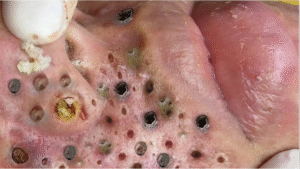Unexplained Goosebumps Could Be Your Body’s Warning System

Goosebumps, those tiny elevations of the skin at the base of our hair follicles, are a common and usually benign physiological response. Typically triggered by cold, fear, or profound emotional experiences, they are a vestige of our body’s “fight or flight” mechanism, initiated by a surge of adrenaline. Whether you’re listening to a stirring piece of music or recalling a powerful memory, the sudden appearance of goosebumps is a normal reaction.
However, when goosebumps manifest frequently and without any discernible cause, it is a clear sign that you should pay closer attention to your body. While most instances are harmless, persistent and unexplained goosebumps can indicate an underlying medical condition that warrants professional evaluation.
When Harmless Goosebumps Become a Health Signal
The distinction between a normal reaction and a potential health concern lies in the context and accompanying symptoms. If goosebumps appear randomly and are joined by other concerning signs, it may be your body’s way of signaling a deeper issue.
Consider the following potential underlying causes:
Disorders of the Nervous System: Conditions such as epilepsy or multiple sclerosis (MS) can interfere with the nervous system’s normal functioning, leading to spontaneous goosebumps. These may be accompanied by other neurological symptoms like numbness, tingling, or confusion.
Seizure Activity: In rare cases, unexplained goosebumps can be a manifestation of a “piloerection seizure.” These seizures may also involve other sensory changes or a brief loss of awareness.
Hormonal Imbalances: Certain tumors, such as pheochromocytomas, can cause an overproduction of adrenaline. This hormonal surge can trigger goosebumps along with a rapid heartbeat, excessive sweating, and anxiety.
Anxiety and Panic Attacks: The body’s acute stress response during a panic attack can certainly produce goosebumps without an external trigger.
Chronic Skin Conditions: It is also worth noting that some skin conditions, like the harmless keratosis pilaris, can create a persistent appearance similar to goosebumps.
When to Consult a Medical Professional
Isolated incidents of goosebumps are generally not a cause for alarm. However, if you experience them repeatedly without a clear reason, it is crucial to seek medical advice. This is especially true if the goosebumps are accompanied by other symptoms, including:
Numbness or weakness
Confusion or changes in consciousness
Mood alterations
Abnormal heart rate or body temperature fluctuations
The Bottom Line
While the vast majority of goosebump occurrences are simply a fascinating and harmless human reflex, they can, in specific contexts, serve as a valuable diagnostic clue. Pay attention to the signals your body is sending. Frequent, unexplained goosebumps, particularly when paired with other symptoms, are a clear sign that you should consult a healthcare provider to rule out any underlying issues.







